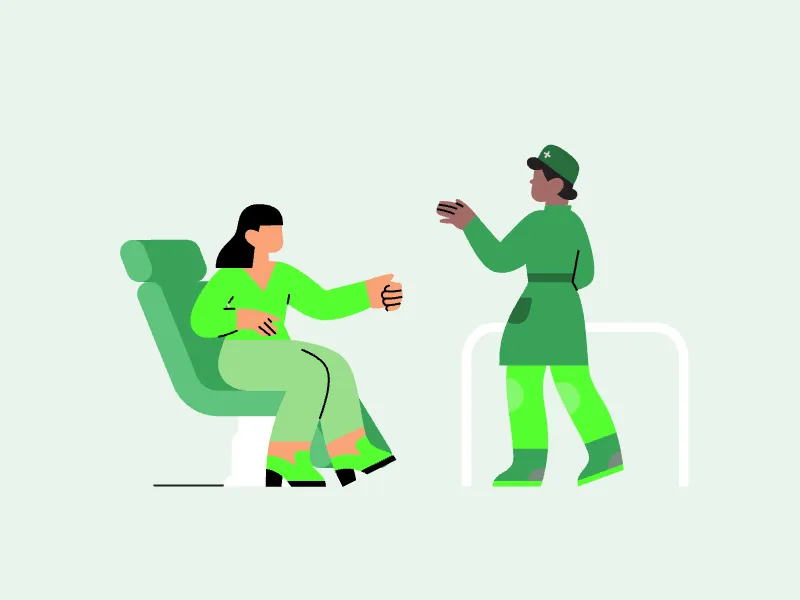What is neurodivergence?
Neurodivergence is a relatively new term, used to describe the ways someone’s brain functions, learns, behaves, and processes. It implies that these processes are different from those of someone considered “neurotypical.”5
It’s important to note that these terms don’t signify brains that function better or worse, but simply differently. People considered neurodivergent have unique strengths and challenges, based on the different ways their brains operate, compared to the strengths and challenges of someone considered neurotypical.5
It’s also important to note that “neurodivergent” is not an official medical term. It was first coined in 1998 to describe the different ways people’s brains develop, and has since been adopted by the medical community—which frequently thinks in more black and white terms—to help describe cases where people aren’t necessarily sick, but rather “differently abled.”5
In fact, there’s no one definition of “normal” when it comes to brain function. Even when people are considered “neurotypical,” it simply means that their mental strengths and challenges aren’t affected by any differences that impact the way their brains work.5
Examples of neurodivergence
Neurodivergence may be more visible than many people think. The most common manifestations of this quality include:5
- Autism spectrum disorder (commonly called autism or ASD)
- Attention-deficit/hyperactivity disorder (ADHD)
- Dyslexia, or difficulty reading
Other forms of neurodivergence include:5
- Dyspraxia, which impacts movement and coordination
- Dyscalculia, or difficulty learning and understanding numbers and math
- Tourette syndrome, a condition that produces certain "tics"
- Down syndrome, a physical and mental developmental disorder
- Bipolar disorder, a mental health condition involving extreme mood swings
- Obsessive-compulsive disorder, a mental health condition involving recurring thoughts and behaviors
The connection between neurodivergence and eating disorders
As research techniques have become more sophisticated, more links between eating disorders and many forms of neurodivergence have been discovered, particularly when it comes to autism and ADHD. At the core of this connection is likely the influence ASD and ADHD have on sensory processing.1
Sensory processing impacts the way, and degree to which, stimuli impact the brain. These stimuli are usually grouped into two distinct categories, including:
- Exteroception: External stimuli, including touch, sound, and sight
- Interoception: Internal stimuli, or cues, regarding things like pain, thirst, and hunger
In many people with ADHD or autistic traits, interoception may be disrupted.
This could lead to a lack of bodily trust—or a feeling of safety within or ownership of one's body—which could contribute to an over-reliance on external sources of appraisal or approval, possibly making someone more susceptible to damaging images and ideas pushed by diet culture and society at large.1
More directly, disrupted interoception can also play a role in disordered eating patterns, thanks to its influence on hunger or thirst cues. This could result in someone missing hunger cues and eating less, contributing to traits of anorexia nervosa (AN), or feeling overwhelmed by hunger cues and eating more, which would lead to issues involved with binge eating disorder (BED) and bulimia nervosa (BN).1
Both autism spectrum disorder and ADHD also frequently involve heightened exteroception. Once again, this can contribute to both the psychological and physiological drivers of eating disorders.
Exteroception plays an outsized role in someone's emotional processing, and heightened exteroception may make someone hyper-aware of their surroundings. This can potentially contribute to mental health conditions like anxiety and depression or personality traits like perfectionism, all of which frequently underpin eating disorders.1
Heightened exteroception can also contribute to physiological complications that can contribute to disordered eating behaviors, including strong aversions to certain textures, colors, or scents involved in food.1
Autism and eating disorders
Autism may play a role in many types of eating disorders, with current research estimating autism prevalence to be as high as 37% among people with these conditions.1
Autism has long been linked to anorexia nervosa, with recent research estimating as many as one in three people with AN having "elevated traits" of ASD.7 Sensory aversions and social anxieties, including trouble eating around others, may all contribute to this overlap.1,8
Some personality traits connected to the two conditions may also explain their link. One qualitative study of women with AN and autism revealed that some participants felt the inflexibility and rigidity associated with their ASD had contributed to food rituals and routines that progressed to disordered behaviors around eating.2
The same study found that body image concerns and a desire to lose weight were not as relevant to the development of AN in participants as issues possibly related to ASD, like social confusion, a need for control, organizational problems related to food shopping and cooking, and the eating disorder becoming an intense subject of interest.2
Avoidant/restrictive food intake disorder (ARFID) is also common among people with autism.4
This eating disorder is characterized by an extreme lack of interest in food; sensory issues, causing strong negative reactions to certain food textures, colors, or smells; and/or an intense fear of vomiting or choking. It goes well beyond simple “picky eating," instead involving severe restriction that can lead to significant malnutrition and health and growth problems.
Once again, sensory processing differences caused by ASD are thought to be behind the overlap. Strong aversions to textures, smells, and colors of food can be linked to the impact ASD has on exteroception, and the same trait has been connected to the restriction of food intake for people with ARFID.4
ADHD and eating disorders
Less research exists on the link between eating disorders and ADHD, but recent studies have suggested a significant connection, with one in particular finding that people with ADHD are three to six times more likely to develop an eating disorder than the general population.1
Experts theorize that impulsivity and inattention—two hallmark traits of ADHD—may have something to do with the link between certain eating disorders and the attention disorder, since these traits can frequently lead to binging behavior. And research seems to support this assertion, with studies showing that childhood impulsivity may predict bulimia nervosa symptom onset in adolescence.3
Other common symptoms of ADHD, including deficits of awareness and unreliable internal hunger and satiety cues, have also been connected to disordered eating behaviors, including both binging and a disinterest in food.6
Complications with treating eating disorders in neurodivergent people
Overall, more research into the relationship between neurodivergence and eating disorders is needed. Unfortunately, this has already played a role in eating disorder treatment.
Research indicates that women with autism tend to benefit less and experience poorer treatment outcomes than non-autistic women with anorexia nervosa. Further supporting this are reports from autistic women in treatment for AN who have stated they felt their needs were not met during eating disorder treatment.2
Certain types of in-person treatment may also prove difficult for some neurodivergent patients, especially those with sensory sensitivities. Group meals and group therapy could trigger anxiety, especially if they involve bright lights or loud sounds. These scenarios could also possibly present distractions for those with heightened exteroception.
For those with ADHD, further challenges exist around medication, as many drugs used to treat the disorder can simultaneously impact appetite.
Potential treatment solutions for neurodivergent individuals
Some of the issues around treatment may be due to the fact that there is no system-wide approach to treating eating disorder patients with neurodivergence. Indeed, many medical professionals have said their inability to tailor treatment to autistic patients stems not from a lack of desire to do so, but from a lack of knowledge in how to provide that type of comprehensive care.2
One current recommendation for better catering to neurodivergent patients with eating disorders is issuing a sensory profile assessment, which can help treatment providers understand a patient's individual interoception and exteroception functioning. This can help build more needs-specific treatment programs.1
It's also possible to create more sensory-friendly treatment environments, including those with dimmed lights, no background noise, and no expectation of social interaction. And greater psychoeducation for the patients themselves has also been recommended, as a way to help them self-advocate for better care.1
Still, more research will ultimately be needed, both to test these concepts and fine-tune any other solutions.
Finding help for an eating disorder
Ultimately, treatment providers should understand that every patient has individual needs, including those with neurodivergence. But even in cases when these differences play a role in treatment, help is always available.
If you or a loved one are struggling with an eating disorder, it's important to seek out help. Your primary care physician, therapist, or another trusted medical professional may be able to write you an official diagnosis or recommend nearby treatment programs.
You can also find help through Within Health. Our unique program allows you to benefit from the care of a personalized treatment team, without having to leave home.
Regardless of where you look for help, the decision to seek it out is the first step on the road to a happier and healthier future.































